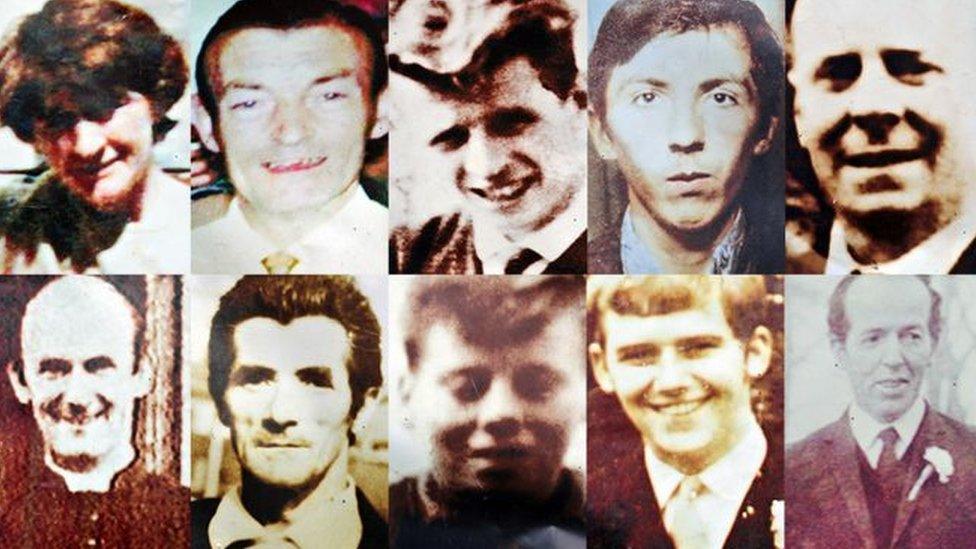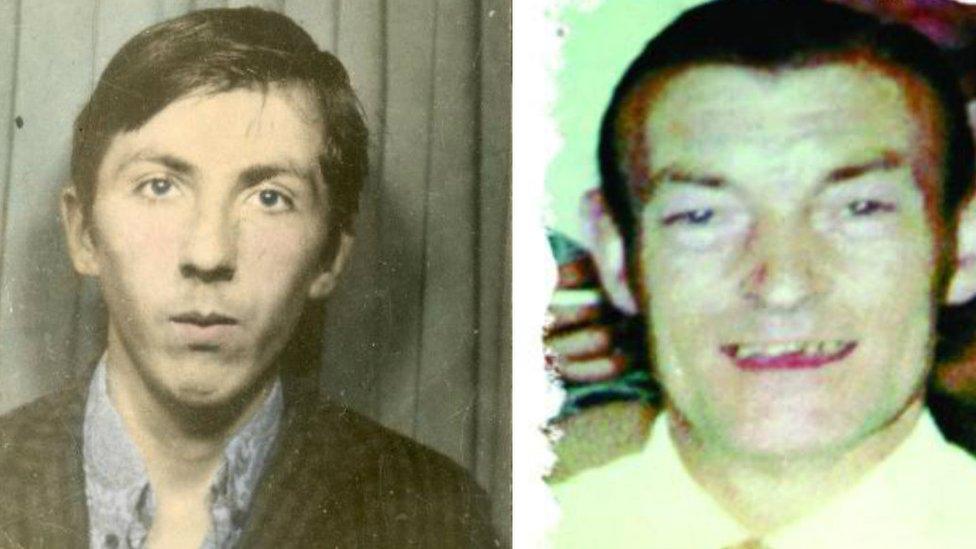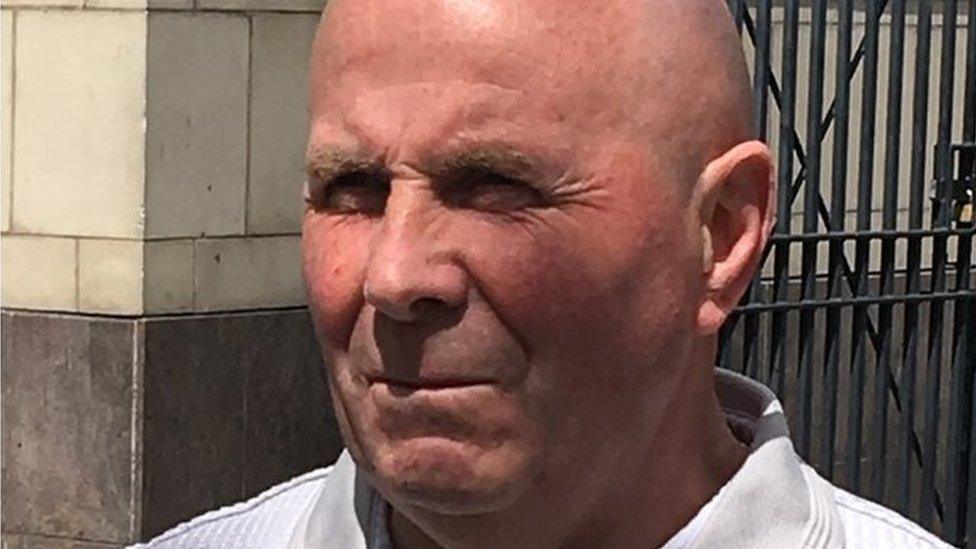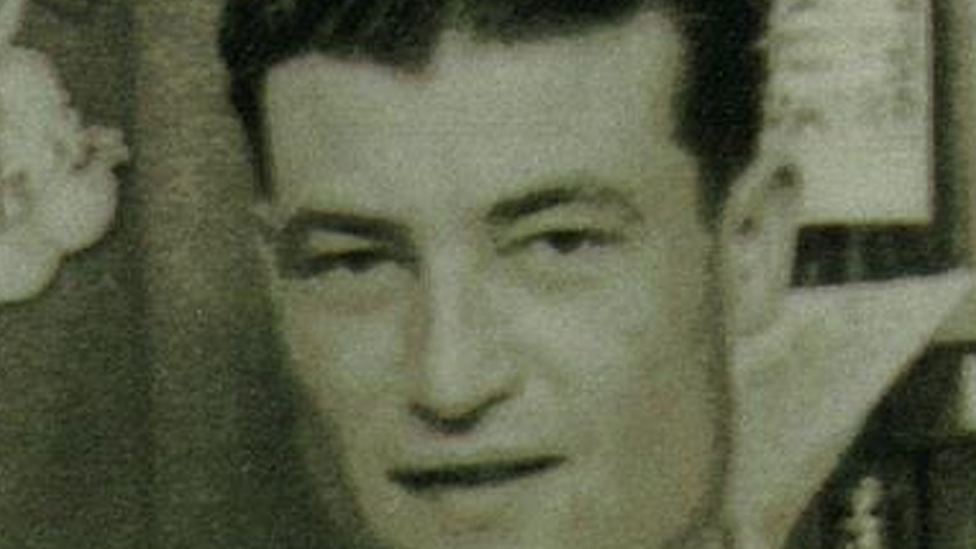Ballymurphy inquest: Teen beatings 'should not have happened'
- Published

An inquest is examining the deaths of 10 people killed in shootings at Ballymurphy in August 1971
A Ministry of Defence (MoD) barrister has told an inquest into the deaths of 10 people in west Belfast in 1971 that the beating of two teenage boys "should never have happened".
The inquest is examining the shootings in Ballymurphy in August that year.
Kevin Rooney QC made the comment while questioning witness Bernard Doyle.
Mr Doyle and his brother have told the inquest that they found a wounded man in their garden and wanted to help but were arrested and beaten by soldiers.
He and his brother were teenagers at the time and were held at Girdwood Barracks for several days.
In its latest phase, the inquest is looking at the deaths of John Laverty, 20, and Joseph Corr, 43, on 11 August 1971.

The inquest is examining the deaths of 20-year-old John Laverty and 43-year-old Joseph Corr
The fatal shootings happened on the Upper Whiterock Road as soldiers of the Parachute Regiment moved into the area.
The family of Joseph Corr believe it was him the brothers had wanted to help, although the boys had not known him.
Answering the barrister's questions, Mr Doyle said: "I got beat relentlessly for trying to help some fellow who'd been shot."
MoD barrister Mr Rooney said he was not suggesting that the beatings had not taken place and added that they should never have happened.
Mr Doyle said he and his brother were initially put in an Army vehicle to be taken to the nearby Henry Taggart base on the Springfield Road.
He told the court he thought to himself: "'I'm dead, I'll never see nobody ever again.'

Bernard Doyle says he and his brother were arrested and beaten
He added: "See, when you go to Henry Taggart, the things they done in Henry Taggart were unreal and I thought: 'I'm dead, I'm dead.'"
They were instead put into a lorry with other detainees and taken to Girdwood Barracks.
He later told the inquest that he went to hospital for treatment for his injuries after his release some days later.
He said the doctor looked at him and asked if he had been run over by a bus.
The sport-mad teenager had suffered a fracture to his lower back and says he still has back pain.
All charges against Mr Doyle were dropped and he was later awarded compensation for the months he was unable to work.
'Saw beaten brothers'
Later at the inquest on Tuesday, a man who had watched the beatings also described seeing a wounded man lying face down in the road outside his home.
Edward McCourt, who is aged 86, was a joiner and lived in Dermott Hill Park in 1971.
He said he woke early on 11 August and looked down to the junction of the Whiterock Road and Springfield Road.
Mr McCourt said he saw a group of about 20 men spread-eagled against a wall, being beaten by soldiers with batons.
Looking up the road, he told the court, he watched the Doyle brothers being beaten.
He said that he then heard shots and went to the front of his home and saw a man lying on the road at the entrance to Dermott Hill Park.
He thought he was about 40 to 45 years old and was wearing a white singlet or shirt.
He believes the wounded man was Joseph Corr.
Mr McCourt saw a bloodstain the size of a dinner plate on the man's back and a smaller one on his front as two paratroopers turned the man over.
He told the court that the man was empty-handed and nothing was lying near him.
'No medical attention'
Two soldiers were crouched near him and took the man and moved him out of sight by dragging at his clothes.
He explained to the inquiry that the soldiers did not seem to offer the man any kind of medical attention.
Mr McCourt told the court he was upset by what he had seen and then noticed two paratroopers with black camouflaged faces in his garden.
He said he opened the window and angrily shouted to the soldiers to leave his garden and go back to their own country.
He recalled that they both smashed in his front door and ran up the stairs of his home.
He said one soldier told him: "I'll blow your effing head off."
When he confronted them and told them his children were in convulsions, he said, the soldiers turned and left.
Shortly afterwards he noticed a convoy of Army vehicles come down from Black Mountain, driving past the end of his street.
Gunfire
Later the court heard from Joseph Marley, who also was a teenager at the time.
He said he had joined his father and many other men keeping a lookout for the possibility of loyalists attacking the area down the Upper Whiterock Road.
He said their family had lived in nearby New Barnsley Grove.
He said they heard activity early on the morning of 11 August and, thinking it was "Orangemen", they decided to chase them off.
There had been shouting and the rattling of bin lids and someone suggested: "Let's charge them."
As the crowd ran up the pavement shouting, gunfire broke out down the road beside them.
It was then, Mr Marley said, that they realised it was, in fact, paratroopers coming down the road.
He said none of the crowd had a weapon of any kind, unless they picked up a stone to throw it.
He added that he did not see any of the soldiers actually firing at the crowd.
He described how one young man was shot in the arm.
He believed many more would have been shot if the pavement had not been raised up from the level of the road.
As they took cover at a nearby house, he said they used a cigarette lighter to help look at the young man's wound in the dawn light.
The young man was taken away by some of them for first aid he said, and the rest crawled back away down the road from the soldiers.
He later concluded that the two men who took him away were Joseph Corr and his son, also Joseph.

Joseph Corr and his father took an injured man away, Mr Marley believes
He said the soldiers spread out into neighbouring streets sometimes using back gardens for cover.
Later he said he had gone home to New Barnsley Grove, when his mother spoke to a soldier and was struck by him.
When he complained, said Mr Marley, the soldier lifted his rifle and fired an un-aimed shot which missed.
Mr Marley's evidence will continue on Wednesday.
The court also heard from a Ministry of Defence barrister that the headquarters logs of 1st Battalion the Parachute Regiment in cannot be located for the period.
A barrister for the Corr family pointed out that the relevant logs had been available to the Bloody Sunday Inquiry.
- Published20 May 2019

- Published10 May 2019
